Peter MALONE
Saturday, 18 September 2021 19:23
Count Your Blessings
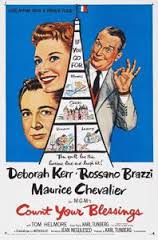
COUNT YOUR BLESSINGS
US, 1959, 102 minutes, Colour.
Deborah Kerr, Rossano Brazzi, Maurice Chevalier, Martin Stephens, Tom Helmore, Ronald Squire, Patricia Medina, Mona Washbourne.
Directed by Jean Negulesco.
Count Your Blessings is based on a novel by Nancy Mitford. It was directed by veteran Jean Negulesco, a director of tough thrillers at Warner Bros in the 1940s, moving to 20th Century- Fox with smaller-budget but very effective dramas including a version of Titanic. However, with How to Marry a Millionaire and Woman’s World in 1954, he began a five-year period of very glossy entertainments including The Rains of Ranchipur, A Certain Smile, The Best of Everything.
The film has an attractive cast led by Deborah Kerr. She plays a woman who marries a French count during World War Two, separated from him for almost nine years, reuniting but finding he is a philanderer. She is still attracted to him but her son, Martin Stephens, does not want them to get back together. The supporting cast is led by Maurice Chevalier as a duke.
This is conventional glossy entertainment, widescreen, colour, luxury settings.
1. The significance and tone of the title? A comedy, romance, human story? How well did these ingredients blend? Which aspect dominated?
2. The English and the Paris settings, colour, Cinemascope, music? A lush background for a romantic woman’s' picture?
3. The establishing of the war situation, the hurriedness of marriages? The pros and cons of such marriages? Grace and her readiness, the impulsiveness of Charles? Her waiting during the years of war, her waiting ten years afterwards? Was this aspect of the plot credible?
4. The film's presentation of Grace? Deborah Kerr’s style, the stiff Englishwoman, her immediate reaction to Charles, her guiding him around London and its formality, her falling in love? The romance of the three days? The birth of Sigi? The device of her making the rug over the years? Should she have just waited, should she have sought Charles out? How strong a character, how silly in some aspects of her character?
5. The contrast with Charles? The suave Frenchman, his military and wealthy background, his war responsibilities, his pushing the advances on Grace? His attitude towards the marriage, motivations? The reasons for hit staying away, imprisonment, other duties, Indo, China? His relationship with other women, especially in Indo-China?
6. The contribution of Nanny and her hostile attitudes towards the French, Grace's father, Hughie and his patience, the various servants?
7. The dramatic impact of Grace and Charles meeting, the need for them to get to know each other, the bases for establishing their marriage? How had each changed? The change that each had to go through during the marriage? The reaction to Sigi? His influence? Did each of them try hard enough? The strengths and weaknesses in each? The importance of Albertine? The motives for Grace's leaving? The decision about the divorce?
8. The presentation of Sigi, his English background and manner, his adapting to the French? A precocious little boy, in relationship to his mother, to his father? His happiness with each, his belief that bad children would be punished, the significance of his running away? The experience of wandering Paris at night? The significance of his
being on the statue at the rally?
9. How did Sigi unite the two? was this credible?
10. The importance of Uncle and his humanity, his love for Grace, his French pride and belief in Charles, his kindness to Sigi?
11. How credible was the ending? The possibilities for the future?
12. What were the main points behind this romantic comedy?
Published in Movie Reviews
Published in
Movie Reviews
Tagged under
Saturday, 18 September 2021 19:23
Countess from Hong Kong, A
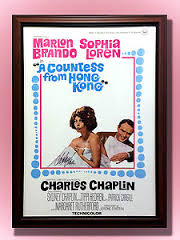
A COUNTESS FROM HONG KONG
UK/US, 1966, 120 minutes, Colour.
Marlon Brando, Sophia Loren, Sidney Chaplin, Tippi Hedren, Patrick Cargill, Michael Medwin, Angela Scoular, Margaret Rutherford.
Directed by Charles Chaplin.
Many consider A Countess from Hong Kong a great mistake on the part of Charlie Chaplin. Over fifty years after he was a legend in Hollywood and had continued over the decades to make many fine films ranging from The Kid, The Gold Rush, The Circus, City Lights, Modern Times, The Great Dictator, Limelight … he attempted something of a comeback.
Many people blame Marlon Brando for the failure of the film and suggest that if a more adept actor at light comedy had been in the role, it might have worked. Brando portrays a diplomat, about to be appointed ambassador to Saudi Arabia, wanting to avoid all scandal when a White Russian countess, allegedly, played by Sophia Loren, hides out in his cabin. His wife (Tippi Hedren) is about to meet him. He urges his assistant, played by Patrick Cargill, to marry the countess.
There are some humorous situations. Chaplin himself appears as an old steward. His son Sidney appears as Harvey. A range of character actors also appear, including Margaret Rutherford.
As with his other films, Chaplin composed the score. ‘This is My Song’ appears in this film. (A more serious look at this kind of situation and character, a White Russian being forced into prostitution in Hong Kong, can be seen in The White Countess, starring Natasha Richardson and Ralph Fiennes, directed by James Ivory, 2005.)
1. How successful a comedy was this? What film comedy conventions and stage conventions did the film use? How well?
2. The film was made by Charles Chaplin in his seventies. Did it bear his mark? How impressive was it for his career? He also wrote the script. How stage bound was it, with so many exits and entrances and hiding?)
3. Did the issues seem real? in its reality? what impact did it have - the American and his situation, in politics, marital relationships, Russian immigrants, illegal entry into America? Did these issues come through importantly or as part of the comedy or both?
4. How impressive a character was Ogden? Marlon Brando’s comic performance? Ogden as a typical rich US politician, his ambitions and plans, his night out on the town, the effect of Natasha on him and the change of plans? Why did he agree to help her? How comic were the sequences of sea sickness, his belching, his hiding, anxiety of situation on the ship? How did Natasha begin to change? His worry about his reputation? His emotion involvement? The involvement with Hudson's marriage and planing to help her escape? The sequences of his relationship with his wife? How realistic and satirical? Were the choices real to him? Why did he choke Natasha?
5. How well did Sophia Loren portray Natasha? How convincingly'? The Hong Kong background, the importance of the sequence of the sailors dancing with the countess? Her explanation of herself, childhood protection, gangsters? Did she seem a pathetic figure or able to take care of herself? Why did she impress Ogden and Harvey? What was so important about going to the United States? How well did Sophia Loren handle the comedy? The farce? The hiding? The marriage with Hudson? How did she change in loving Ogden? Why? Her relationship with Hudson and her despising him? The sequence of her dancing on the ship? The escape? Her final happiness?
6. How well did the fi1m portray romantic love? Was it convincing and moving? Comic? Real?
7. How important was Hudson in the film? Patrick Cargill’s comic performance? His remarks, his English American background, the comedy of the marriage, the wedding night? How did he add to the value of the film in its comedy?
8. Was Harvey well developed as a character? How credible was his helping of Ogden and Natascha? How interesting was his character and any insight into his character?
9. The importance of Martha in the film? as an ambitious American wife, going on surface appearances, her disdain for Ogden and yet her wanting to patch up the marriage for political reasons? How well was she observed as a character? How much satire?
10. How amusing were the incidental characters? the captain and the marriage, the suitor pursuing Natasha down the corridors, visiting the dowager with flowers? Margaret Rutherf6rd's performance as the seasick dowager and the comedy? The society girl and the dancing, talking continually about daddy's opinions? Did these add to the film and even brighten it?
11. Comment on the use of colour, Charles Chaplin’s music and the themes of love? location photography, Hawaii?
12. How light an entertaining comedy was this film? Its portrayal of values and audience involvement in these?
Published in Movie Reviews
Published in
Movie Reviews
Tagged under
Saturday, 18 September 2021 19:23
Corvette Summer
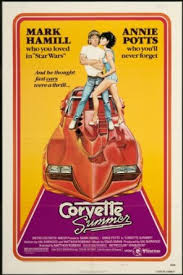
CORVETTE SUMMER
US, 1978, 108 minutes, Colour.
Mark Hamill, Annie Potts, Eugene Roche.
Directed by Matthew Robbins.
Corvette Summer is one of the many films about cars from the 1970s, an era when there were many, many road movies.
This was written by the young team of Matthew Robinson, Hal Barwood, who wrote a number of films during the 1980s, directed by Robbins. They include Dragonslayer, The Legend of Billie Jean and batteries not included.
They are obviously enthusiastic about cars. Mark Hamill portrays a young college student who loves Corvettes, is a mechanic, builds an ideal car which is then stolen. He sets out for Las Vegas to recover it and comes across a van set up as a brothel with a young teenager, played by Annie Potts.
They are both over their heads in their quest, have a great deal of adventures, experience some violence – before the inevitable happy ending.
Annie Potts won a Golden Globe for best newcomer of the year. Mark Hamill had just made an impression the year before as Luke Skywalker in Star Wars.
1. The focus of the title? Care and their predominance? A summer story? The focus on youth? For what audience was the film made. with what appeal? Its success?
2. The importance of the colour photography the musical score and the songs, the glossy surface? Los Angeles, the focus on care and machines, the Californian desert and Nevada, the world of Las Vegas and its look? The atmosphere of gambling, criminals, prostitutes, work?
3. The importance of cars in the contemporary world, the love of cars? The hero and his knowledge, love of building, pride? The opening sequences at the car disposal and the choice of the Corvette? The images and their comment on the world of cars, use and disposability? Criteria for selection? The energy with which the car was rebuilt? The importance of the school and the community contribution to the building? The atmosphere and pride of the car, the celebration? The emotional impact of its being stolen? The hero and his mission to recover the car, the lengths to which he would go, the happy ending?
4. How attractive a young man was the hero? In himself, personality, knowledge and love of cars, his work? His home in Los Angeles? Shy, dating? His mother and her offhand manner with the caravan and her leaving him with only a message? The reaction to the loss of the car, his decision to go to Las Vegas? The newspaper, the photo, his naive enterprise in setting out? The humour of the hitchhiking, for example, the blacks in the elaborate and slow car? The encounter with Vanessa and her van? The contrast with the bizarre world of fantasy and reality with Vanessa and the hero's realism in finding his car? His arrival in Las Vegas, poverty, sleeping. work?
5. His alertness to the car, notification of the police, chasing it, visiting the casinos and making mistakes? The importance of the chase after the car on the pushbike? The encounter with the criminals and the beating? His continued communication with Mr. McGrath? and the sending of the postcards? The irony of McGrath’s? being involved in the racket? The proposition for wealth and work and his succumbing to this? The hypocrisy of the criminals being friendly with him after their bashing him? The build-up of his enjoyment of wealth and Vanessa’s reaction, his pride and his taking back of the car? The drama of the chase and the rejoicing in his return? His sense of achievement? His disillusionment, especially with Mr. McGrath?
6. Vanessa and her place in the film, her van, ambitions to be a hooker, the way that she spoke, her attitudes towards work, sexuality, money? Her black eye and failure as a hooker? The various jobs, hair styling, hamburgers and fast food? Her friendliness with the hero, taking him into the van and looking after him? A growing love for him? Her annoyance and going back to Rosalie as a hooker and wealthy? The hero's taking her away from this and her participation in the recovery of the car and her happiness at the end?
7. The character sketch of Mr. McGrath? and his contribution to the building, as a contact for the hero, his kindness to his mother, his involvement in the deals. presence in Las Vegas, his explanation of his reasons the cover of respectability his tears and the hero letting him off at the end?
8. The portrait of Las Vegas criminals, violence? The elaborate car pursuit and evasion?
9. A particular glimpse of American life in the seventies? how accurate a sketch of people, situations? How well could the audience identify, enjoy?
Published in Movie Reviews
Published in
Movie Reviews
Tagged under
Saturday, 18 September 2021 19:23
Constant Husband, The
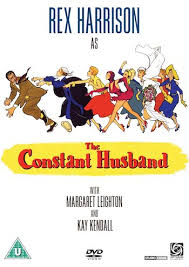
THE CONSTANT HUSBAND
UK, 1955, 88 minutes, Colour.
Rex Harrison, Margaret Leighton, Kay Kendall, Cecil Parker, Nicole Maurey, George Cole, Raymond Huntly, Michael Hordern, Robert Coote.
Directed by Sidney Gilliat.
The Constant Husband is a light-touch comedy with serious overtones. It was written and directed by Sidney Gilliat who had been writing films since the late 1920s and had a partnership with Frank Launder. They made a number of very striking films from the UK over the decades. Gilliat himself directed a number including State Secret, Green for Danger, The Story of Gilbert and Sullivan.
Rex Harrison does his usual style as a man who gradually wakes up in Wales unable to remember anything about himself. Cecil Parker portrays the psychiatrist who helps him to remember. However, he would prefer not to remember as the personality who is revealed is very much a cad, a conman, charming with women and having many wives, hence the title of the film.
The supporting cast includes a lot of regulars from English comedies at the time including George Cole, Michael Hordern and Robert Coote.
Rex Harrison is at his best in this kind of role, very mannered, but very much Rex Harrison. Margaret Leighton, on the other hand, was much more an actress for serious films. Kay Kendall is one of the supporting cast and was to appear with Harrison in The Reluctant Debutante, and to marry him.
1. How enjoyable was this comedy? The tone and theme of the title? What were the best aspects of the comedy? The human observation? The English style?
2. How much did the success of the film depend on Rex Harrison and his style? How adequate and successful was he?
3. The commonness of the amnesia theme? How well was it used in this film? With what originality? The theme of a person seeking his identity? Starting from nothing and building up an identity? The shock of discovery of the real person? Comment on the styles of the discovery of identity? Of the puzzle of identity?
4. Introduction to Charles, his waking up, his searching for the truth? the comic aspects? the puzzling aspects? His relationship with the Doctor? His continued discovery? His relationship with his photographer wife? The contrast with the Italians? The effect of all of this on him?
5. The different homes that he had set up? The different places that his personality sought? comment especially on the Italian situations.
6. The humour of the court case? Why was this interesting, enjoyable?
7. The importance of having counsel and defence? Why did she become infatuated with Charles? What did this illustrate about him and his magnetic personality? Was he loveable?
8. How appropriate was the ending? An easy way out of this light froth of a comedy? A point being made?
9. How enjoyably did the film illustrate the themes about men and women, the relationship between them, the irresistible response to a man such as Charles? How telling a satire on men and women?
Published in Movie Reviews
Published in
Movie Reviews
Tagged under
Saturday, 18 September 2021 19:23
Corn is Green, The/
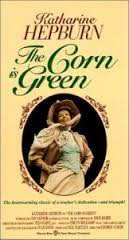
THE CORN IS GREEN
US, 1979, 93 minutes, Colour.
Katharine Hepburn, Ian Saynor, Patricia Hayes, Anna Massey.
Directed by George Cukor.
A superior telemovie adaptation of Emlyn William’s popular play. The original film version starred Bette Davis and John Dall in 1943. They were directed by Irving Rapper.
This version in directed by George Cukor and he made it in his late seventies. Cukor was a celebrated film director for fifty years and won an Oscar for 'My Fair Lady'. Many stars won Oscars under his direction and he was noted as a woman's director for his sensitivity and courtesy in working with them. He made at least ten films with Katharine Hepburn including Sylvia Scarlett, The Philadelphia Story, several Tracy/Hepburn films as The Keeper of the Flame, Adam’s Rib, Pat and Mike and a telemovie with Laurence Olivier in 1974, Love Among the Ruins.
Cukor's treatment of this play is calm and sensitive and has a very fine re-creation of period with the use of Welsh locations. Katherine Hepburn is her late sixties, uses her familiar mannerisms as well as her imposing presence in the role of the forward-thinking teacher Miss Muffet. She receives very good support from a British cast. The film is both entertaining and interesting and shows the qualities possible for telemovies.
1. How good a telemovie adaptation of a popular play and film? How entertaining, interesting?
2. The film as a Katherine Hepburn vehicle? Katherine Hepburn's presence in her late sixties and her capacity for sustaining a film? The comparison with Bette Davis in the original film version? Audience expectations of Katherine Hepburn? George Cukor's sensitivity in direction and presentation of Katherine Hepburn?
3. The difference in a telemovie presentation of this play from a cinema version? For the home audience. sustaining interest and emotional response?
4. The Welsh setting, the 19th century atmosphere, beauty? The contrast with the ugliness of the mines and the harsh way of life? The look and the sounds of Wales? The contribution of the musical score. the traditional songs?
5. The audience entering with Miss Muffet, sharing her experience, her challenges, joys and sorrows?
6. Katherine Hepburn's presence as Miss Muffet, her interpretation of the role? Miss Muffet as a strong-minded woman, spinster and accepting this? Her forward-thinking views, her arrival, the clash with the Squire? Her intentions of starting a school. her success and coping? The boys and the men and their reaction - fear of being thought ill of but supporting her? Morgan and his skills, the essay on The Corn is Green? Her decision to promote him? Mr Jones and her various assistants? The way that she related to people and spurred them on?
7. Miss Muffet’s success with Morgan, the methods of study, his response, her strategies, even obsession? Her drive? The encounter with the Squire and persuading him to be the patron (in contrast with her early insulting him?)? This being too much for Morgan, his nightmares, his clash with Miss Muffet?
8. The importance of the scholarship, the examination? The clash with Miss Muffet, Bessie and her seduction of Morgan, his aggressive taking her? Her return and her pregnancy? Her getting money from Miss Muffet? Morgan’s having to cope with the prospect of uncertainty, the scholarship, marriage, the child? His meeting Miss Muffet as an equal after the scholarship result and taking her advice? Taking his opportunities and facing the future?
9. The repercussions on Miss Muffet? How attractive a character was she, how hard, how realistic?
10. Mr Jones and his changing jobs, questions about religion, devotion to Miss Muffet? Miss Ronberry and her primness. Mice Muffet’s advice about being a spinster. getting her help in the school? Her reaction to Bessie's child?
11. Mice Muffet’s companion, her attitude towards Bessie and not liking her, her story about her kleptomania? Her attitude towards the school and her help? Bessie as her daughter, her sullenness, her feeling restricted, work? The seduction of Morgan. her blackmail, her companion and the prospect of marriage, her easily giving up her child? The melodramatic coincidences of her return and the scholarship?
12. How attractive a character was Morgan? His background. Father, gifts, fearing to seem foolish to the miners, their mining way of life? His dreams, ambitions? The fulfilment? Nightmares and pressure? Coping with the examination? His conduct of himself at Oxford? Final decisions - was he right?
13. The portrait of the Squire and his 19th century attitudes towards the village, his bounty, views on women, education? Miss Muffet’s strategy in persuading him to patronise Morgan? His involvement and supervision of the exams etc.?
14. The background of realism of Welsh life, the mines? Accidents? The need for education?
15. The themes of education, opportunity, equality? The possibilities of education in transforming a person?
Published in Movie Reviews
Published in
Movie Reviews
Tagged under
Saturday, 18 September 2021 19:23
Corky
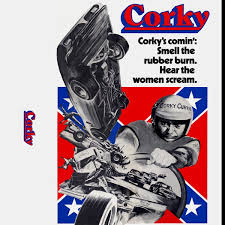
CORKY
US, 1972, 88 minutes, Colour.
Robert Blake, Charlotte Rampling, Patrick O’ Neal, Christopher Connolly, Ben Johnson, Laurence Luckinbill.
Directed by Leonard Horn.
Corky is a star vehicle for Robert Blake who had emerged as an adult actor in In Cold Blood after a childhood career. He plays an unsympathetic man who wants to be a stockcar racing driver champion. In unusual casting, Charlotte Rampling appears as his wife.
The film is typical of the early 70s action racing films. It was directed by Leonard Horn, a prolific director of television in the 1960s and early 1970s. This was one of his few feature films for the big screen. He died in 1975.
1. Was this an enjoyable film? Why? How enjoyable was it meant to be? A picture of stock cars on the wide screen? Typical characters? Excitement and danger?
2. Or was it moralising film? If so, how? The focus on Corky, his character, his failures, his death?
3. What was the audience meant to identify with? How much with Corky? As a person, personality, family man, the drag race at the beginning, his joking nature, his vitality and excitement, his weaknesses?
4. In what way was the audience repulsed by him? His meanness, his irresponsibility, his hurting of others? Steve in the car, leaving wife and family, humiliating his friend, humiliating himself?
5. How typical was Corky of people and life? His good and his bad? His chips on his shoulder? His ambitions to be something, frustrations and failure? How much insight did the film give into this kind of real living? How real were the personalities in the film?
6. How pessimistic a film was this? Could Corky have redeemed himself? Could others? The role of his wife? His memories of her and his return? His judging of her betrayal of him? The fact that it all ended in death and failure? Did the film offer pessimism as its view of life?
7. How well did the film capture the atmosphere of California? The people, their language and accents? Buildings and towns, racing courses and bars? Did this enhance the reality of the themes?
8. How sympathetic was Corky’s wife? How loving? How dependent on him? her sharing in his wins and his work? response to his leaving her? His irresponsibility? What else could she do? Was it right for her to seek a divorce? Was she dependent on Randy? What effect did this have on Corky? Was he so unreasonable?
9. The character of’ Randy? His relationship with Corky and his employing Corky? Was he right to forbid Corky to drive for him because of Corky's failure and not driving properly? What effect did this have on Corky? How much in the right was Randy? The result of Corky injuring Steve because of this?
10. How sympathetic was Corky’s friend? Their happiness together? The scenes of fooling around? The incidents in the bar? Corky’s memory of his wife? Why did he pick a fight with his friend? How humiliating of his friend when he punched him? On whose side were you during these sequences? Why?
11. What was Corky reduced to by the end? His going for a swim with the children? His further humiliation? Being stripped of almost everything? Was this a chance for him to be redeemed? Is this why he returned?
12. Reaction to his jealously? How unreasonable was he? impact of his violence and his duty? (A typical American method of acting, feeling?)? How horrifying is this kind of violence?
13. The impact of the ending? Dying in the stock car? His life and ambitions? His memories as he died? Was he meant to be modern man as he died? a failure, achievement?
14. Comment on the technical success of the film, wide screen, the use of colour, locations, close-ups, flashbacks, the stock car sequences and car excitement and glorification?
Published in Movie Reviews
Published in
Movie Reviews
Tagged under
Saturday, 18 September 2021 19:23
Coonskin
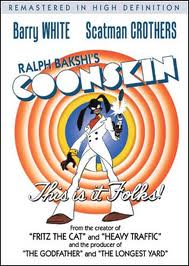
COONSKIN
US, 1975, 100 minutes, Colour.
Barry White, Charles Gordone, Philip Michael Thomas.
Directed by Ralph Bakshi.
Coonskin is yet another animated feature by Ralph Bakshi. He acquired fame with his scurrilous satire, Fritz the Cat and its sequel, Heavy Traffic, in which he blended real-life film with animation. This is the style of Coonskin.
Two prisoners make their escape from a jail. In the meantime the older prisoner is telling a story to the younger one, which seems to anticipate the action of the animated part of the film. It is a heavy satire on the crime films of the seventies, the gangster films and the Mafia films especially The Godfather, which it directly parodies. Bakshi is not afraid to give gross emphasis to particular aspects of his theme and does not always go for subtlety. His style of animation is very vivid and the overall effect is arresting, even if it is not particularly palatable. He moved to a much more wide approach to his audiences in his next film, the science fiction parable, Wizards.
1. The overall impact of the film? For whom was it made? An American audience, African American audience? The effect on each?
2. The blending of live action and animation? The effect?
3. Comment on the style of animation, realistic style, symbolic, comic strip and style?
4. The African American atmosphere, the reference to the title, language and idiom, music?
5. How could the film be seen as a fable? A moral tone (amoral tone and point?)
6. The focus on the preacher, the purpose, the film framed with him,'? His place in the fable?
7. The real life? The two men, the telling of the story? The purpose of the story, foreboding? making the men
more desperate for escape?
8. The hero, in prison, black, the black situation and oppression, prejudice? The need for self-assertion?
9. The presentation of the hero as conventionally tough and self-assertive, the women, violence, crime? The attention to detail in this career? Enhanced by the animation and the effects of the animation?
10. His assistant, the friendship, the gap, the setup for the betrayal?
11. The portrayal of women in the film, prostitutes? Relationships between men and women?
12. The presentation of the police and the satire on police films? The creating of the scene and the self-assertion and victory of the hero?
13. The portrayal of the gangsters’ scene and satire on gangster films? The detail of atmosphere?
14. The satire on the Mafia especially on The Godfather? The satire on the effeminate sons of The Godfather? The setting of the scene, the violence, the victory, the hero?
15. The emphasis of the film that the black man wins out over all in such a corrupt world?
16. A parable for the African American situation in a corrupt America?
Published in Movie Reviews
Published in
Movie Reviews
Tagged under
Saturday, 18 September 2021 19:23
Consequence, The/ Die Konsequenz
DIE KONSEQUENZ (THE CONSEQUENCE)
Germany, 1977, 100 minutes, Black and white.
Jurgen Prochnow, Ernst Hannawald.
Directed by Wolfgang Petersen.
The Consequence is a German prison film and shows the ugly side of prisons and reform institutions for adolescents. The film offers a critique of these institutions and the attitudes of German society. The film also treats issues of homosexuality in a very frank manner - but with a touch of sentimentality.
The film was directed and co-written by Wolfgang Petersen, the German director who has made such films as Black and White Like Day and Night with Bruno Ganz, the story of an obsessive chess player who suffers mental breakdown. The film is interesting in its dealing with human relationships as well an its portrait of society and its pressures.
Petersen directed the Oscar-winning Das Boot and then went to Hollywood for a long career in action and spectaculars (In the Line of Fire, Outbreak, Perfect Storm, Troy, Poseidon).
1. The significance of the title, the starting with the flashbacks and the indications of what the consequence was? A portrait of people, society. attitudes and behaviour? Moral judgment on society?
2. German production, the impact of German society and issues? Universal response? The world of prisons and the Gorman experience and universal experience? The focus on relationships, love, homosexuality in itself, relationships, sexual experience, crime? The film's stance on homosexuality?
3. The focus on Martin as a character, his offence and the treatment in prison because of his offence, ridicule, criticism, victimization? His background as an actor? His sentence being prolonged? His involvement in the play, his work with the other prisoners? The themes of prison life, rights, work, treatment?
4. The homosexuality theme in prison, the homosexual prisoners and their behaviour? Thomas and his participating in the play? Martin's needs, Thomas’s advances, the night together? The tenderness of their relationship, its permanence, hopes for both?
5. The presentation of the prison officials and their attitudes? The old prisoner who betrayed Martin to the officials? Thomas’s parents and their reactions to Thomas’s behaviour, association with criminals, with homosexuals?
6. How well portrayed was Thomas - the crucial portrayal for the emotional involvement of the audience, for judgments about issues? As a boy, life in the prison, relationship to his parents and his comment on their dull way of life? Participation in the play and the sequences of the play and his performance, his watching? Fascination with Martin? Discussion about homosexuality? His being in the prison cell, making the advances and the decisions, spending the night? The repercussions of the convict betraying him? His attitude towards his parents and the final confrontation with them about homosexuality, their reaction and his response to this? His decision about his life, wanting to live with Martin? The possibility of happiness? Question of age, maturity, emotional maturity, ability to cope?
7. The sudden taking him away to the institute, the court case and his parents’ attitudes and comments? His parents and their treatment of him? Life In the institute, the supervisor and his bullying Thomas? C Group and the isolation? The presentation in detail of the way of life in the institute? The character portrayal of the boys? Brutality,
Violence, attitude towards each other? Sexuality - and Babette and the grossness of the encounters with her, the boys lining up, their taking Martin down for a joke? Hid need to escape, the need to make a phone call, the violent repercussions of this?
8. Martin and his involvement for Thomas? Concern, letters, forging of the papers and the way that he had to pay for them, in interview, clash of ideologies about psychological treatment of the boys? His work in the institute, care for Thomas, his being dismissed and the arranging of the escape?
9. The transition to the world of the politician,, his wealth, power, corruption. pornographic films, his chauffeur, his helping but the binding of him to his service? escape?
10. Martin's development as an actor and his loneliness without Thomas? His skill as an actor, growing career? Communication with Thomas, going to meet him, forgiveness, continuing to help, the puzzle at the end with the attempted suicide? How rounded was the portrait of Martin? A sympathetic character?
11. Thomas and his decline, with the politician, education, his letter of explanation and hid work ad a prostitute, his decision to go back to the institute, his being subdued, scared? The encounter with Martin on his release, his sullenness, his breaking? The attempted suicide and his disappearance – the consequences of the title?
12. Where did the film say blame lay? In Thomas, Martin, society,
13. The picture of prisons? Prisons as reflecting the attitudes of society?
14. The themes of the law, morals and the law, personal freedom, conscious responsibility, pressures? Society's standards and hypocrisies?
15. Themes of sexuality - ad illustrated in the life of the prisoners, the attitude of Thomas’s parents and the discussions in the court? Homosexuality ad a contemporary issue, morality, the law?
16. Insight into human beings and understanding of human beings in their strengths and weaknesses and being victims of circumstances?
Germany, 1977, 100 minutes, Black and white.
Jurgen Prochnow, Ernst Hannawald.
Directed by Wolfgang Petersen.
The Consequence is a German prison film and shows the ugly side of prisons and reform institutions for adolescents. The film offers a critique of these institutions and the attitudes of German society. The film also treats issues of homosexuality in a very frank manner - but with a touch of sentimentality.
The film was directed and co-written by Wolfgang Petersen, the German director who has made such films as Black and White Like Day and Night with Bruno Ganz, the story of an obsessive chess player who suffers mental breakdown. The film is interesting in its dealing with human relationships as well an its portrait of society and its pressures.
Petersen directed the Oscar-winning Das Boot and then went to Hollywood for a long career in action and spectaculars (In the Line of Fire, Outbreak, Perfect Storm, Troy, Poseidon).
1. The significance of the title, the starting with the flashbacks and the indications of what the consequence was? A portrait of people, society. attitudes and behaviour? Moral judgment on society?
2. German production, the impact of German society and issues? Universal response? The world of prisons and the Gorman experience and universal experience? The focus on relationships, love, homosexuality in itself, relationships, sexual experience, crime? The film's stance on homosexuality?
3. The focus on Martin as a character, his offence and the treatment in prison because of his offence, ridicule, criticism, victimization? His background as an actor? His sentence being prolonged? His involvement in the play, his work with the other prisoners? The themes of prison life, rights, work, treatment?
4. The homosexuality theme in prison, the homosexual prisoners and their behaviour? Thomas and his participating in the play? Martin's needs, Thomas’s advances, the night together? The tenderness of their relationship, its permanence, hopes for both?
5. The presentation of the prison officials and their attitudes? The old prisoner who betrayed Martin to the officials? Thomas’s parents and their reactions to Thomas’s behaviour, association with criminals, with homosexuals?
6. How well portrayed was Thomas - the crucial portrayal for the emotional involvement of the audience, for judgments about issues? As a boy, life in the prison, relationship to his parents and his comment on their dull way of life? Participation in the play and the sequences of the play and his performance, his watching? Fascination with Martin? Discussion about homosexuality? His being in the prison cell, making the advances and the decisions, spending the night? The repercussions of the convict betraying him? His attitude towards his parents and the final confrontation with them about homosexuality, their reaction and his response to this? His decision about his life, wanting to live with Martin? The possibility of happiness? Question of age, maturity, emotional maturity, ability to cope?
7. The sudden taking him away to the institute, the court case and his parents’ attitudes and comments? His parents and their treatment of him? Life In the institute, the supervisor and his bullying Thomas? C Group and the isolation? The presentation in detail of the way of life in the institute? The character portrayal of the boys? Brutality,
Violence, attitude towards each other? Sexuality - and Babette and the grossness of the encounters with her, the boys lining up, their taking Martin down for a joke? Hid need to escape, the need to make a phone call, the violent repercussions of this?
8. Martin and his involvement for Thomas? Concern, letters, forging of the papers and the way that he had to pay for them, in interview, clash of ideologies about psychological treatment of the boys? His work in the institute, care for Thomas, his being dismissed and the arranging of the escape?
9. The transition to the world of the politician,, his wealth, power, corruption. pornographic films, his chauffeur, his helping but the binding of him to his service? escape?
10. Martin's development as an actor and his loneliness without Thomas? His skill as an actor, growing career? Communication with Thomas, going to meet him, forgiveness, continuing to help, the puzzle at the end with the attempted suicide? How rounded was the portrait of Martin? A sympathetic character?
11. Thomas and his decline, with the politician, education, his letter of explanation and hid work ad a prostitute, his decision to go back to the institute, his being subdued, scared? The encounter with Martin on his release, his sullenness, his breaking? The attempted suicide and his disappearance – the consequences of the title?
12. Where did the film say blame lay? In Thomas, Martin, society,
13. The picture of prisons? Prisons as reflecting the attitudes of society?
14. The themes of the law, morals and the law, personal freedom, conscious responsibility, pressures? Society's standards and hypocrisies?
15. Themes of sexuality - ad illustrated in the life of the prisoners, the attitude of Thomas’s parents and the discussions in the court? Homosexuality ad a contemporary issue, morality, the law?
16. Insight into human beings and understanding of human beings in their strengths and weaknesses and being victims of circumstances?
Published in Movie Reviews
Published in
Movie Reviews
Tagged under
Saturday, 18 September 2021 19:23
Conquest of the Earth
CONQUEST OF THE EARTH
US, 1980, 96 minutes, Colour.
Lorne Greene, John Colicos, Kent Mc Cord, William Daniels, Sharon Acker, Robyn Douglass.
Directed by Barry Crane, Sidney Hayers.
The third cinema feature from the Battle Star Galactica series after Battle Star Galactica and Mission Galactica. The film is made up of television episodes, hence three directors. The film is the work of the creator writer Glen A. Larson. Lorne Greene continues his role as Adarma but the rest of the cast is entirely new.
The film has all the elements of the Battle Star Galactica films and episodes, adventures in outer space in the Battle Star, the search for Earth and the humans. It also has sequences of confrontation with the Sylons - still menacing in their robot form as well as well as their humanoid leader played snarlingly by John Colicos. The Sylons almost discover Earth but their humanoid forms are defeated by the heroes. The heroes provide a lot of the humour of the film - it takes advantage of the popularity of time travel films of the late seventies (Time After Time, Somewhere in Time, The Final Count Down). As the Battle Star nears Earth, spies are sent out and don human form. They have some humorous adventures trying to make contact with humans as well as cope with 20th century vocabulary and such undeveloped machines as the telephone. There is also a touch of romance.
The film also shows imagination in special effects by presenting a computer prediction of what would happen if Los Angeles were attacked by the Sylons. This makes for some excellent special effect work. The film is strong on the usual themes of intergalactic wars with their mythical overtones. There are searches, quests, heroes and heroines, struggles and endurance, split second climaxes. This latter comes also with some bewildered comic support from radio personality Wolfman Jack.
All in all, an undemanding but enjoyable contribution to the trend, of space films of the seventies and eighties.
US, 1980, 96 minutes, Colour.
Lorne Greene, John Colicos, Kent Mc Cord, William Daniels, Sharon Acker, Robyn Douglass.
Directed by Barry Crane, Sidney Hayers.
The third cinema feature from the Battle Star Galactica series after Battle Star Galactica and Mission Galactica. The film is made up of television episodes, hence three directors. The film is the work of the creator writer Glen A. Larson. Lorne Greene continues his role as Adarma but the rest of the cast is entirely new.
The film has all the elements of the Battle Star Galactica films and episodes, adventures in outer space in the Battle Star, the search for Earth and the humans. It also has sequences of confrontation with the Sylons - still menacing in their robot form as well as well as their humanoid leader played snarlingly by John Colicos. The Sylons almost discover Earth but their humanoid forms are defeated by the heroes. The heroes provide a lot of the humour of the film - it takes advantage of the popularity of time travel films of the late seventies (Time After Time, Somewhere in Time, The Final Count Down). As the Battle Star nears Earth, spies are sent out and don human form. They have some humorous adventures trying to make contact with humans as well as cope with 20th century vocabulary and such undeveloped machines as the telephone. There is also a touch of romance.
The film also shows imagination in special effects by presenting a computer prediction of what would happen if Los Angeles were attacked by the Sylons. This makes for some excellent special effect work. The film is strong on the usual themes of intergalactic wars with their mythical overtones. There are searches, quests, heroes and heroines, struggles and endurance, split second climaxes. This latter comes also with some bewildered comic support from radio personality Wolfman Jack.
All in all, an undemanding but enjoyable contribution to the trend, of space films of the seventies and eighties.
Published in Movie Reviews
Published in
Movie Reviews
Tagged under
Saturday, 18 September 2021 19:23
Goin' Down the Road
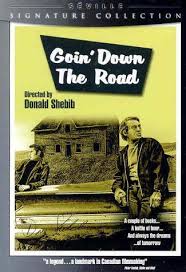
GOIN' DOWN THE ROAD
Canada, 1970, 88 minutes, Colour.
Doug Mc Grath, Paul Bradley.
Directed by Donald Shebib.
Goin' Down the Road is a good Canadian film, made with the assistance of the Canadian government. It tells the story of two labourers from Nova Scotia who hope for something better in the city, who manage to survive and enjoy themselves for a while, but who become victims of city pressures and fail to take their responsibilities.
The theme sounds like a T.V. documentary feature theme and the whole film is reminiscent of the features made by people like Kenneth Loach, Cathy Come Home or Poor Cow, as well as the excellent short stories made by the National Canadian Film Board, like Phoebe or No Reason to Stay. Acting is excellent, so natural that it is hard to believe the principal characters are actors and we follow their work, enjoyment, hardships as if a T.V. news crew were continually following them and showing their lives as they happen.
A slice of life, the film does not arrive at any conclusions. nor does it fully get inside the characters it observes to help us understand deeply how they 'tick'. But, as a film of observation and picturing of Canadian city life, 1970, the kind of life lived in any English speaking city anywhere in the world. it is very good.
1. How long did it take for you to get interested in the principal characters of the film?
2. How typical were Pete and Joey? Why did they come to the city? What did they hope to gain? How naive were they?
3. Comment on the scene in the Salvation Army shelter. What 'gave them the creeps'?
4. What was the significance of Pete's interview for a job in advertising? What did the sequence tell you of Pete?
5. What did the pair live for? How important was their work, drinking, having a good time, girls? Pete tells his friend that he wants something better in life than working in a factory with nothing to show for it. His friend can't even see what he is getting at. Why?
6. How was the theme of relationships and communications developed in the film? Why did Joey fall in love with Betty? Why couldn't Pete communicate with the other girl?
7. Was the wedding sequence well done? Why?
8. How much dream was in Joey's and Betty's buying the flat with all mod cons?
9. How did you feel when the two were put off work? Was this fair?
10. why would the three living in the one room be inevitably unsatisfactory? How did the film show this?
11. Why did the shoplifting plan at the supermarket go wrong?
12. Do people like Pete and Joey bash people and then run off to lie low, avoiding responsibility?
13. What did the film communicate to you about the life and attitudes and yearnings of the ordinary person in the street? Was this a compassionate film?
Published in Movie Reviews
Published in
Movie Reviews
Tagged under